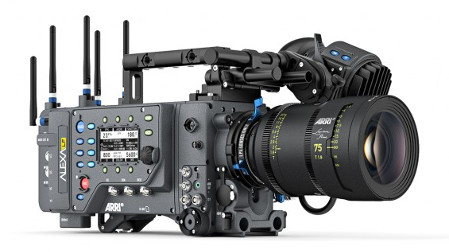The professional video industry's #1 source for news, trends and product and tech information. Sign up below.
You are now subscribed
Your newsletter sign-up was successful
LONDON—Today in London at the BSC Expo, ARRI has introduced a complete large-format camera system based on the large-format version of its Alexa sensor. The system, which includes the Alexa LF camera, ARRI Signature Prime lenses, LPL lens mount and PL-to-LPL adapter, exceeds the requirements of modern production, the company said.

“The larger Alexa LF sensor has the same optimal pixel size as other Alexas, resulting in a 4448x3096 image,” an ARRI press release quotes company product manager for camera systems Marc Shipman-Mueller as saying. “This doesn’t just add definition, it creates a whole new look—one that is truly immersive, with a three-dimensional feel.”
The sensor, which is slightly bigger than full frame, allows the camera to record native 4K, giving filmmakers the opportunity to explore the aesthetic of working with a large format while retaining pleasing skin tones and the ability to leverage HDR and WCG workflows, the company said. The camera records in ProRes and uncompressed, unencrypted ARRIRAW at up to 150fps.
Sixteen large-format ARRI Signature Prime lenses, ranging from 12mm to 280mm and fitted with the ARRI LPL mount, will be available for use with the new camera. The Signature Prime lenses include the next generation of ARRI’s Lens Data System, LDS-2.
The camera’s LPL lens mount is optimized for large-format sensors. It offers a wider diameter and shorter flange focal depth, which allows the ARRI Signature Primes and future large-format lenses to be small and lightweight, the company said. Existing PL mount lenses and Alexa accessories can be used with the camera system’s PL-to-LPL adapter.
The first Alexa LF cameras will ship at the end of March 2018, the company said. The first set of ARRI Signature Prime lenses, including the 35mm, 47mm, 75mm and 125mm, will ship by early June 2018 and the remaining lenses will ship over the rest of the year.
More information is available on the ARRI website.
The professional video industry's #1 source for news, trends and product and tech information. Sign up below.
Phil Kurz is a contributing editor to TV Tech. He has written about TV and video technology for more than 30 years and served as editor of three leading industry magazines. He earned a Bachelor of Journalism and a Master’s Degree in Journalism from the University of Missouri-Columbia School of Journalism.

